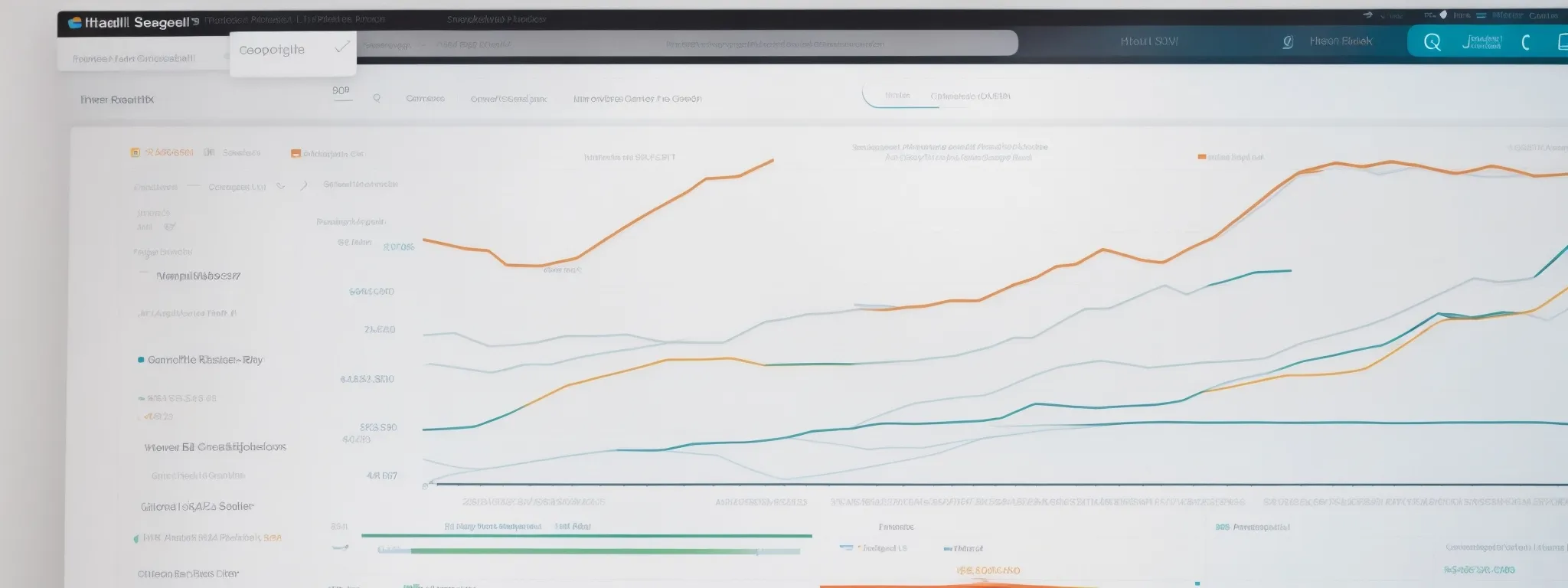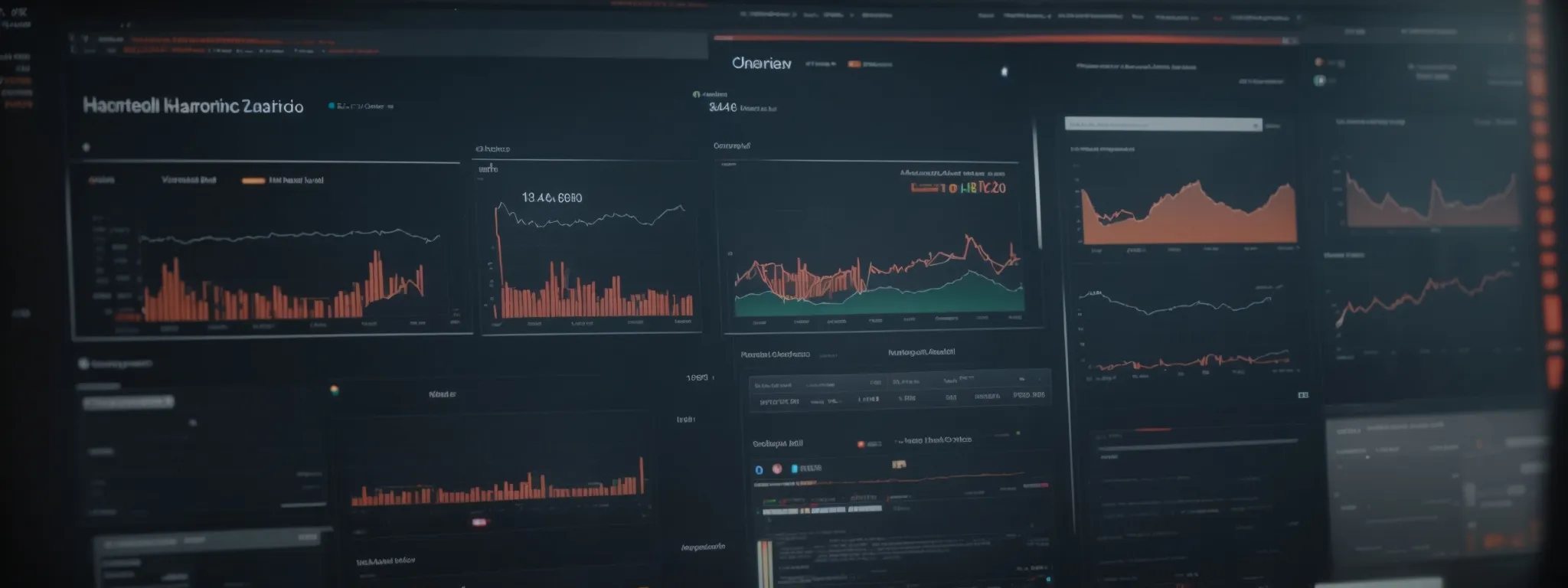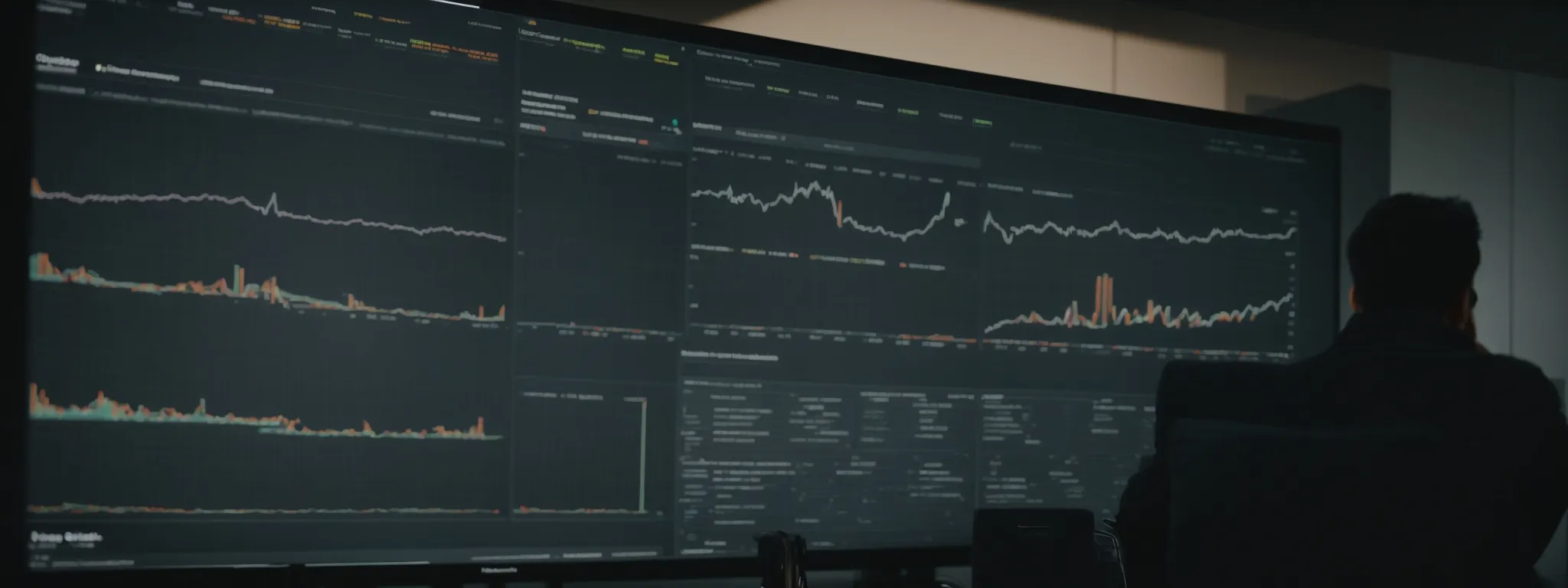Stay Ahead of Your Competitors with Rank Tracking SEO
Master Competitive SEO Strategies With Advanced Rank Tracking Techniques In the complex terrain of digital marketing, mastering SEO demands not only creativity but also a reliance on […]
Master Competitive SEO Strategies With Advanced Rank Tracking Techniques
In the complex terrain of digital marketing, mastering SEO demands not only creativity but also a reliance on data-driven strategies.
Among the myriad tactics, advanced rank tracking stands out as the compass that guides businesses towards search engine supremacy.
LinkGraph has perfected the art of harnessing this tool with precision-driven technology to help clients eclipse competitors and climb the search engine results page.
Insights gleaned from LinkGraph’s sophisticated analysis pinpoints the trajectory for impactful SEO campaigns and tailored content strategies.
Keep reading to unveil the transformative power of LinkGraph’s rank tracking techniques and how they can fortify your SEO strategy.
Key Takeaways
- Rank Tracking Aligns SEO Strategies With Business Goals, Providing Actionable Insights for Improvement
- Local SEO Is Vital for Capturing Regional Audiences, With Strategies Focused on Optimizing Google Business Profile and Local Search Factors
- Mobile-First Indexing and Understanding Mobile User Intent Are Essential for Maintaining Visibility in Mobile Search Results
- Multilingual SEO Expands Brand Reach by Navigating Language-Specific Keyword Tracking and Cultural Nuances
- A Multilingual Rank Tracking Dashboard Is a Key Tool for Managing International SEO and Monitoring Performance Across Languages
Elevate SEO With Precision Keyword Rank Tracking

Businesses seeking to secure a formidable online presence must harness the power of rank tracking to propel their SEO strategies.
Mastering this facet of optimization involves a meticulous approach to identifying and monitoring valuable keywords.
The progression starts with pinpointing keywords that not only resonate with a brand’s offerings but also promise high returns when it comes to visibility on search engines.
Subsequently, setting precise benchmarks becomes a pivotal step.
These benchmarks serve as a guide, indicating the effectiveness of SEO initiatives and paving the way for informed adjustments.
To ensure an accurate pulse on SEO performance, the frequency and timing of rank checks must be strategically planned.
This enables businesses to capture the dynamics of search engine results pages with precision, tailoring their strategies for maximum impact.
Identifying Valuable Keywords for Tracking
Effective SEO begins with the artful selection of target keywords, a task in which LinkGraph excels with the assistance of their Search Atlas SEO tool. These target keywords are the lighthouses guiding prospective customers through the tumultuous seas of the internet to the safe harbor of a client’s content.
Through meticulous keyword research, LinkGraph identifies not only those search terms with the optimal search volume but also those with the potential to drive conversions. This dual-faceted approach ensures that every keyword on a client’s list is calibrated to enhance visibility and engagement in search engine rankings.
Setting Benchmarks for SEO Success
Setting benchmarks for SEO success becomes imperative as businesses endeavor to quantify the impact of their keyword positioning efforts. By leveraging LinkGraph’s cutting-edge rank tracking tools, organizations can establish performance metrics that serve as tangible goals for their SEO campaigns.
- Choose the right performance indicators aligned with business objectives.
- Track keyword rankings across various search engines and devices.
- Analyze the progress and recalibrate the strategies as needed.
With the assistance of Search Atlas, LinkGraph’s clients convene around detailed reports that show not only keyword rank improvements but also how these translate into meaningful traffic and user engagement. These benchmarks empower clients to stay agile, making data-driven decisions to enhance their online presence.
Frequency and Timing of Rank Checks
Intelligent timing and frequency of rank checks are imperative for capturing accurate SEO insights. LinkGraph’s SEO services incorporate strategic rank tracking that discerns the optimal moments to gauge keyword performance, ensuring that clients receive the most relevant data.
The duration between rank checks should reflect the volatility of the client’s industry: fast-paced markets may necessitate daily tracking, while stable niches could benefit from weekly or monthly analyses. This precision allows for agile responses to shifts in search engine results page (SERP) dynamics and bolsters SEO efficacy:
| Industry Type | Recommended Rank Check Frequency | Benefits |
|---|---|---|
| Fast-Paced (e.g., Tech, News) | Daily | Quick adaptation to SERP changes |
| Stable (e.g., Local Services, Manufacturing) | Weekly/Monthly | Sustained optimization with strategic focus |
Leveraging Rank Tracking for Competitive Analysis

As businesses seek to carve out and defend their niche in an increasingly competitive digital landscape, the deployment of sophisticated rank tracking becomes an indispensable weapon in their SEO arsenal.
Expert scrutiny of competitor keyword strategies unfolds critical insights, allowing organizations to anticipate movements and pivot sharply in response.
By integrating advanced techniques that go beyond mere rank tracking to delve into the undercurrents of competitor rankings, businesses stand poised to refine their own tactics; this proactive stance, informed by direct data analysis, affords them the acumen to adjust and augment their approach, ensuring their SEO strategy remains both dynamic and robust.
Analyzing Competitor Keyword Strategies
Within the realm of SEO, analyzing competitor keyword strategies is akin to unveiling the battle plans of one’s adversaries. LinkGraph, utilizing its Search Atlas tool, conducts comprehensive Backlink Analysis and keyword research to extract actionable insights from competing brands’ SEO playbook. These evaluations illuminate the strengths and gaps within a client’s own keyword list, facilitating reinvigorated content strategies and on-page SEO optimizations.
Embarking on such a forensic study of competitor keyword performance pivots the direction of content creation and Guest Posting techniques, effectively capturing the audience that is currently tethered to competitive entities. Search Atlas enables this surveillance, offering an expansive view of SERP landscapes where keyword performance, SEO ranks, and user engagement draw a map for clients to navigate and outmaneuver their competitors strategically.
Spotting Trends in Competitor Rankings
Spotting trends in competitor rankings is an invaluable component of a robust SEO strategy. By analyzing shifts in search engine ranking over time, LinkGraph’s Search Atlas SEO tool assists clients in understanding the trajectory and tactics of their competitors. Such insights facilitate quick strategic adjustments and smart targeting in content creation to capitalize on revealed opportunities.
Utilizing the advanced rank tracking capabilities of Search Atlas, LinkGraph identifies patterns in competitor keyword performance. This nuanced detection aids in distinguishing fleeting anomalies from sustainable trends, empowering clients to develop SEO efforts that are responsive and results-oriented, effectively staying one step ahead in highly competitive markets.
Adjusting Your Approach Based on Data
Adjusting one’s SEO campaign based on data is a critical aspect of maintaining a competitive edge. LinkGraph, through its analytical prowess facilitated by Search Atlas, provides a granular view of keyword rank data, enabling businesses to refine their strategies with precision. This approach allows for SEO tactics to be honed in real-time, aligning efforts with the ever-evolving contours of search engine algorithms and consumer behavior.
Through this adaptive methodology, LinkGraph ensures its clients are not merely reacting to past search trends but actively shaping their future search presence. Data-informed adjustments can lead to more targeted content strategies and on-page SEO improvements, all aimed at enhancing visibility and engagement, and ultimately driving greater traffic and conversions in a highly competitive digital marketplace.
Advanced Techniques in Rank Tracking for Niche Markets

When it comes to niche markets, one size does not fit all in the realm of SEO rank tracking.
Precision is paramount, necessitating customized strategies that recognize the unique keywords and ranking dynamics particular to these specialized industries.
It is in this intricate space that LinkGraph’s prowess becomes particularly pronounced, offering advanced rank tracking techniques through the robust Search Atlas SEO tool, designed to uncover deep insights and foster impactful SEO tactics tailored for niche competitiveness.
The ascension in niche market rankings is a deliberate process, one which LinkGraph navigates with deftness and dexterity, adapting strategies to not just meet but exceed the specific demands of a targeted niche.
Tailoring Rank Tracking to Niche-Specific Keywords
Niche-specific keywords require an approach that appreciates the subtle nuances of a specialized market. LinkGraph’s SEO services thrive in these aspects, with the Search Atlas tool meticulously fine-tuning rank tracking to align with the client’s distinct industry language, ensuring a tailored fit for their unique keywords and customer search habits.
Adaptation and specificity are at the heart of effective rank tracking for niche markets. LinkGraph leverages this refined strategy, ensuring that the keyword tracking is not merely generic but exceptionally targeted to capture the precise search intent of a smaller, more defined audience, thereby enhancing the client’s competitive edge within their specialized sector.
Understanding Niche Market Ranking Dynamics
Grasping niche market dynamics is a delicate endeavor, one where the subtleties of user behavior and industry-specific search patterns are magnified. LinkGraph leverages the precision of their Search Atlas tool to dissect these intricacies, translating the ebb and flow of niche-specific search engine results into impactful SEO intelligence.
By harnessing this deep dive into niche market dynamics, LinkGraph enables clients to forecast potential shifts and preemptively tailor their SEO tactics. It’s a strategic refinement process: sharpening target keyword focus, evaluating competitor movements, and calibrating on-page efforts with pinpoint accuracy:
- Analyses current niche keyword trends, assessing the impact on client search visibility.
- Scrutinizes competitor keyword positioning within the niche, extracting strategic opportunities.
- Adjusts on-page SEO and content strategies to align with emerging niche market patterns.
Adapting SEO Tactics for Niche Competitiveness
Navigating the intricacies of niche markets demands a tactical agility that can only be fostered through a deep understanding of sector-specific SEO. LinkGraph, with its integrated approach utilizing the Search Atlas tool, finetunes SEO tactics that resonate emphatically within niche communities, ensuring that client brands not only meet but surpass the expectations of a discerning audience that is seeking specific, specialized content.
In the pursuit of niche competitiveness, LinkGraph’s On-Page SEO Services are meticulously crafted to address the nuanced requirements of niche audiences. The team’s expert analyses observe consumer behavior and algorithmic preferences, adapting content strategies and SEO activities accordingly to generate not just traffic, but actionable leads that sustain a business’s growth and market position.
Integrating Rank Tracking With Overall SEO Strategy

Within the multifaceted arena of Search Engine Optimization, the strategic integration of rank tracking serves as a cornerstone for discerning the effectiveness of SEO campaigns.
Aligning rank tracking with overarching SEO goals enables LinkGraph’s clients to quantify their success and identify critical areas for enhancement.
By channeling rank data directly into content development, businesses craft narratives that resonate more deeply with their target audience, capturing and sustaining user interest.
Furthermore, leveraging ranking insights to elevate on-page optimization ensures that every element of a website is fine-tuned for peak performance in search engine results.
LinkGraph’s comprehensive approach intertwines rank tracking with each facet of an SEO strategy, cultivating an ecosystem of digital excellence.
Aligning Rank Tracking With SEO Goals
Rank tracking is not merely a standalone metric but a strategic compass guiding SEO campaigns towards their intended targets. When LinkGraph leverages rank tracking alongside clients’ SEO goals, it transcends beyond simple data collection, becoming a transformative force that aligns keyword performance with business objectives, driving campaigns to achieve measurable success in search engine visibility and user engagement.
The meticulous integration of rank tracking with SEO goals by LinkGraph ensures that each SEO initiative is attributable to concrete outcomes. By interlacing keyword rank advancements with broader marketing aims, LinkGraph crafts a coherent strategy where rank improvements directly contribute to increased brand prominence and, ultimately, a fortified digital presence.
Incorporating Rank Data Into Content Development
Incorporating rank data into content development is a critical move that allows LinkGraph’s clients to refine their messaging for maximum resonance with their desired audience. This targeted approach ensures that the produced content not only ranks well but also caters to the searching patterns and preferences of prospective customers.
Seamlessly blending rank tracking insights into Content Strategy, LinkGraph crafts narratives that not only captivate but also convert. This methodical inclusion of keyword performance data enriches the relevancy of content, bolstering its ability to establish a brand as a leader in its domain on the digital stage.
Enhancing on-Page Optimization With Ranking Insights
Ranking insights gleaned from advanced tracking tools like Search Atlas are instrumental in refining on-page SEO techniques. LinkGraph capitalizes on these insights to optimize meta-descriptions, headings, and content to align more closely with the search queries that drive traffic, thus increasing the likelihood of a higher search engine results page placement for their clients.
LinkGraph’s meticulous application of rank tracking data fine-tunes website elements down to the most granular level. This precision enables the identification of which specific on-page factors—be they keyword density, internal linking, or page loading speed—are influencing search rankings, allowing for targeted optimizations that boost overall SEO performance.
Exploring the Potential of Local Rank Tracking

In an environment where local search visibility can make or break a business, understanding the nuances of local rank tracking is pivotal for companies aiming to conquer their immediate market.
LinkGraph’s foray into Local SEO equips businesses with tailored tactics that specifically target the ever-important Google Business Profile and various local search factors.
With a keen focus on the local elements of SEO, LinkGraph’s strategies are designed to optimize rank tracking efforts that reflect the true impact of local listings, offering a comprehensive approach to enhancing local search visibility and placing brands at the forefront where local customers are searching.
Adjusting Rank Tracking Tactics for Local SEO
Local SEO presents a distinctive challenge within the realm of rank tracking, requiring strategies that account for both the geographic specificity of search terms and the weight of localized search factors. Recognizing this, LinkGraph refines rank tracking methods, ensuring clients can monitor the performance of keywords within the context of a local search engine results page, where factors such as a Google Business Profile can deeply influence visibility.
Comprehensive rank tracking in a local sphere demands custom-tailored approaches that consider the unique consumer behaviors of a community. To achieve this, LinkGraph incorporates geolocation-based rank tracking, enabling businesses to discern their search engine standings within precise locales. This targeted data acts as a beacon, guiding local SEO strategies with acute precision to outstrip local competition.
Recognizing the Impact of Local Listings on Ranks
Local listings hold significant sway in determining a brand’s rank, especially within the sphere of Local SEO. The strategic management of a Google Business Profile and local citations can dramatically elevate a brand’s search result prominence, ensuring that it stands out to a localized audience effectively seeking out services or products.
LinkGraph accentuates the prowess of advanced Local SEO strategies by emphasizing the importance of local listings which, when optimized correctly, can lead to an amplified online presence. This focused approach allows businesses to capitalize on heightened local visibility, directly influencing their ranking success and customer acquisition within their community.
Strategies for Improving Local Search Visibility
LinkGraph harnesses sophisticated geo-specific rank tracking to uplift a brand’s local search visibility, ensuring that businesses effectively connect with their regional audience. By optimizing for local search, LinkGraph’s clients experience a surge in regional prominence, solidifying their standings within the intricacies of local SERPs and drawing in a more targeted customer base.
Through the integration of bespoke Local SEO tactics, LinkGraph empowers businesses to dominate their local markets. The focus is on refining Google Business Profile details and local content relevance, thereby enhancing the discoverability of businesses for local search queries and driving considerable increases in organic, location-based traffic and customer interaction.
Tracking and Analyzing SERP Feature Opportunities

As the digital terrain becomes progressively competitive, the pursuit of SEO dominance extends beyond traditional organic rankings to include the strategic conquest of SERP features.
Understanding the SERP landscape, where features like Featured Snippets and People Also Ask (PAA) boxes become pivotal battlegrounds, is essential for brands aiming to enhance their online visiblity.
LinkGraph’s advanced SEO techniques delve into the tactical measures essential for seizing these dynamic opportunities, ensuring that clients not only identify the most beneficial SERP features for their target keywords but also implement strategies to optimize for them effectively.
Moreover, by measuring how these features influence web traffic, LinkGraph provides clients with a comprehensive analysis of their SEO strategy’s performance.
Identifying Target SERP Features for Your Keywords
Within the arsenal of SEO techniques, identifying the appropriate SERP features aligned with a brand’s target keywords is critical for amplifying online visibility. LinkGraph’s Search Atlas SEO tool systematically pinpoints SERP opportunities such as Featured Snippets, Knowledge Panels, or Image Packs that are relevant to the specific keyword set a business is aiming to rank for.
Tactically chasing these features enhances the likelihood that a brand’s content will not just appear but also stand out on the first page of search results. The prioritized targeting of SERP features by LinkGraph culminates in elevated brand visibility and potentially an increase in click-through rates:
- Identification of SERP features most prevalent for important keywords.
- Evaluation of existing content’s compatibility with desired SERP features.
- Strategization of content adjustments to improve SERP feature eligibility.
Techniques to Rank for Featured Snippets and PAA
To secure positions within Featured Snippets and People Also Ask (PAA) sections, LinkGraph employs a sophisticated content optimization process. This method includes crafting succinct, authoritative responses to commonly asked questions, directly targeting the informational needs and search patterns of users.
Once LinkGraph identifies potential Featured Snippet and PAA opportunities through comprehensive SERP analysis, the following strategic actions are set into motion:
- Optimization of on-page headings and structured content for direct answer queries.
- Strengthening page authority with well-researched, factual content that aligns with search intent.
- Improving the website’s overall crawlability to ensure search engines can easily index and retrieve information.
Moreover, LinkGraph ensures the content is formatted with the user experience in mind, increasing the chances of capturing these valuable SERP features. This involves utilizing bullet points, numbered lists, and clear, concise language to maximize readability and relevance.
Measuring the Impact of SERP Features on Traffic
Quantifying the impact of SERP features on web traffic is a critical step LinkGraph employs to validate the effectiveness of SEO strategies for their clients. By monitoring changes in traffic volume following the capture of SERP features like Featured Snippets or Local Packs, LinkGraph can directly correlate the visibility of these features with increased user visits.
These metrics are paramount for understanding which SERP features yield the most significant gains in visibility and user engagement. Subsequently, LinkGraph integrates these findings into a cohesive SEO strategy, ensuring clients optimize for the most impactful features to drive traffic and enhance their digital footprint:
- Gathering and analyzing SERP feature visibility.
- Evaluating traffic before and after gaining SERP features.
- Adjusting SEO tactics to maximize feature-related traffic increases.
Understanding the Role of Mobile Rank Tracking

In today’s digital era, the ubiquity of smartphones has fundamentally altered the SEO landscape, necessitating meticulous mobile rank tracking as an integral component of competitive SEO strategies.
Recognizing the divergence of mobile and desktop rankings, businesses must adjust their SEO efforts to account for Google’s mobile-first indexing, ensuring their digital properties are optimized across all devices.
Likewise, discerning mobile user intent is crucial for accurate rank tracking, as it shapes search behavior and the subsequent visibility within search engine results.
The adept analysis and adaptation to these mobile-centric factors are essential for brands that aim to master their SEO approach and achieve prominence in an increasingly mobile-oriented online environment.
Divergence of Mobile and Desktop Rankings
In the ever-evolving SEO landscape, the disparity between mobile and desktop rankings is a compelling aspect that requires businesses’ attention. With LinkGraph’s advanced SEO services, companies can discern distinct ranking factors that influence mobile SERPs, recognizing the need for a responsive design and mobile-friendly content to align with Google’s mobile-first indexing approach. This strategic focus ensures a consistent user experience across all devices, which is crucial for maintaining a strong search engine presence.
It is critical for SEO agencies like LinkGraph to keep abreast of the divergent behaviors of search algorithms across devices. Mobile users exhibit unique search patterns and intent, which differ markedly from those on desktop, and this significantly impacts keyword rankings. By leveraging the data-driven analyses provided by Search Atlas, LinkGraph enables its clients to fine-tune their SEO efforts, ensuring maximized visibility where user engagement is increasingly taking place – on mobile devices.
Optimizing for Mobile-First Indexing
With Google firmly entrenched in a mobile-first approach, it is imperative for businesses to ensure their websites are meticulously optimized for mobile users. This means prioritizing fast load times, mobile-friendly designs, and content that addresses the mobile audience’s search habits and requirements.
Optimizing for mobile-first indexing is a fundamental step in remaining relevant and visible in mobile search rankings:
- Implementing responsive design to provide seamless user experiences across various screen sizes and devices.
- Ensuring website speed is optimized for mobile, considering that load times significantly affect bounce rates and user satisfaction.
- Refining content to suit the search patterns of mobile users, who typically seek quick, easily digestible information.
Mobile User Intent and Its Influence on Tracking
Grasping mobile user intent is a crucial cog in the mechanism of sophisticated rank tracking. LinkGraph leverages the dynamic insights provided by their Search Atlas tool that deftly captures and interprets this intent, enabling businesses to sculpt their mobile SEO strategies with precision and cater to the mobile searcher’s immediate and context-driven needs.
LinkGraph’s analysis of mobile user behavior offers a wealth of information that directly impacts the effectiveness of rank tracking results. By accounting for the nuances of mobile search queries, LinkGraph ensures that a brand’s digital presence is optimized to capture the attention of on-the-go users, ultimately enhancing visibility and engagement in mobile search engine results.
Advanced Rank Tracking for Multilingual SEO

In the pursuit of a global digital footprint, businesses encounter the intricate challenge of mastering multilingual SEO, a prowess that expands their reach beyond linguistic borders.
Advanced rank tracking in multiple languages requires a deft touch; one must navigate the subtleties of language-specific keyword tracking, appreciate the profound influence of cultural nuances, and synthesize this information into a streamlined, multilingual rank tracking dashboard.
LinkGraph rises to meet these complexities, offering strategies designed to capture the diverse manifestations of consumer search behaviors worldwide and transform them into competitive SEO advantages.
Language-Specific Keyword Tracking Challenges
Confronting the nuances of language-specific keyword tracking presents a formidable impediment in the domain of multilingual SEO. LinkGraph recognizes that keywords do not merely translate but must be thoroughly researched within the cultural and linguistic context of each target market to ensure relevance and search efficacy.
Appreciating the search patterns in different languages is a multifaceted task that often reveals unexpected idiomatic and regional variations. LinkGraph caters to these subtleties by deploying the Search Atlas tool, designed to conduct in-depth keyword analysis across diverse linguistic landscapes:
- Conducting comprehensive keyword research in each language to uncover culturally-relevant search terms.
- Applying nuanced linguistic insights to adapt SEO strategies for each target demographic.
- Monitoring keyword performance with a multilingual rank tracker to maintain SEO effectiveness across borders.
Cultural Factors in Rank Tracking and SEO
Cultural factors play a pivotal role in shaping the nuances of SEO in different regions, necessitating a sophisticated approach to rank tracking that transcends mere translation. It is essential for SEO strategies to encompass the vast array of cultural preferences and internet usage patterns that vary across global audiences to ensure relevance and effectiveness in multilingual campaigns.
LinkGraph’s savvy adaptation to these complexities includes the recognition of localized search intent, the integration of regional trends into content strategies, and the consideration of local holidays and customary online behaviors that impact search and conversion rates:
- Analysis of region-specific search trends to understand cultural influences on SEO.
- Integration of local cultural insights into content creation.
- Crafting targeted campaigns that resonate with regional events and consumer behaviors.
By leveraging this deep cultural understanding, LinkGraph aligns clients’ SEO tactics with a keen awareness of regional subtleties, enabling businesses to authentically engage with diverse markets and capitalize on the tailored preferences of an international audience.
Building a Multilingual Rank Tracking Dashboard
LinkGraph spearheads the creation of a multilingual rank tracking dashboard, an essential tool for businesses operating across international markets. This dashboard is meticulously engineered to provide a unified view of keyword rankings across different languages, enabling SEO teams to efficiently monitor and compare performance data on a global scale.
This integrated approach streamlines the task of multilingual SEO, ensuring that disparities in rankings due to linguistic variations are quickly identified and addressed. LinkGraph’s advanced SEO platform, Search Atlas, simplifies the complex process of managing multiple rank tracking campaigns, offering clients an indispensable resource in their quest for international SEO dominance.
Frequently Asked Questions
How can precision keyword rank tracking improve SEO performance?
Precision keyword rank tracking is instrumental in enhancing SEO performance, as it enables marketers to monitor fluctuations in keyword positions on the search engine results page, thereby providing actionable insights to refine SEO strategies. By using an advanced rank tracking tool, such as LinkGraph’s Search Atlas, businesses gain the necessary data to understand the impact of their SEO efforts, optimize their content strategy, and stay ahead of competitors in the rankings race.
How can rank tracking be leveraged for competitive analysis in the SEO industry?
Rank tracking enables businesses to monitor keyword performance and spot opportunities by observing trends and changes in search engine results page positions. By leveraging this data from a robust rank tracking tool like Search Atlas, companies can fine-tune their SEO strategies to outpace competitors in valuable search terms.
What advanced techniques in rank tracking can be used to gain an edge in niche markets?
Advanced rank tracking techniques involve deploying sophisticated software like LinkGraph’s Search Atlas, which enables user-specific geolocation searches, SERP feature tracking, and monitoring the performance of long-tail keywords. By harnessing tailored tools offered by such platforms, businesses can capture niche-specific keyword performance and competitor strategies, thereby identifying opportunities for strategic content and backlink enhancements.
How can integrating rank tracking with overall SEO strategy enhance website performance?
Integrating rank tracking into an overall SEO strategy is essential as it provides clear insights into keyword performance and competitor benchmarking, enabling businesses to pivot and refine their approaches for improved search engine visibility. By monitoring fluctuations in search engine results pages, companies can directly correlate changes in their strategies with variations in rankings, facilitating a more dynamic and results-oriented SEO campaign.
What are the benefits of local rank tracking and how can it be utilized effectively?
Local rank tracking provides businesses with the critical insights needed to understand how their brand performs in search engine results pages across different geographies, enabling tailored strategies that capture the attentions of a regional audience. By utilizing this tool effectively, firms can prioritize and refine local SEO tactics to outperform competitors in specific areas, thereby potentially increasing visibility and fostering higher conversion rates from local searches.
Conclusion
Rank tracking is an essential element in the arsenal of competitive SEO strategies. With advanced techniques, businesses can pinpoint valuable keywords, set benchmarks, and adjust their strategies as needed. LinkGraph’s Search Atlas tool exemplifies the power of fine-tuning SEO for various industries, competitive analysis, and niche markets.
Tailored rank tracking enhances local SEO performance, capitalizes on SERP features, and addresses the unique demands of mobile and multilingual search environments. With the integration of advanced tools like RankTracker, businesses can delve into comprehensive rank tracking that goes beyond basic keyword monitoring. This involves tracking competitors, analyzing SEO metrics, and generating insightful reports.
The effectiveness of rank tracking software is showcased by its ability to provide valuable keyword data, empowering businesses to refine their SEO efforts. SEO PowerSuite, as an example, offers robust features for rank tracking, competitor analysis, and SEO reporting. It enables businesses to track competitors’ rankings, evaluate SEO metrics, and generate detailed reports for actionable insights.
For beginners in SEO, tools like Rank Tracker Tool provide an accessible entry point into rank tracking, allowing businesses to understand and optimize their keyword performance. Whether dealing with thousands of keywords or focusing on a specific niche, rank tracking software offers the flexibility to cater to diverse business needs.
Incorporating rank tracking into an overall SEO strategy is essential for businesses aiming to thrive in the competitive digital landscape. The availability of advanced tools and software, such as RankTracker, SEO PowerSuite, and Rank Tracker Tool, empowers businesses to track millions of keywords, monitor competitors, and generate meaningful SEO reports. By leveraging these tools, businesses can achieve measurable success in visibility and engagement.














































































